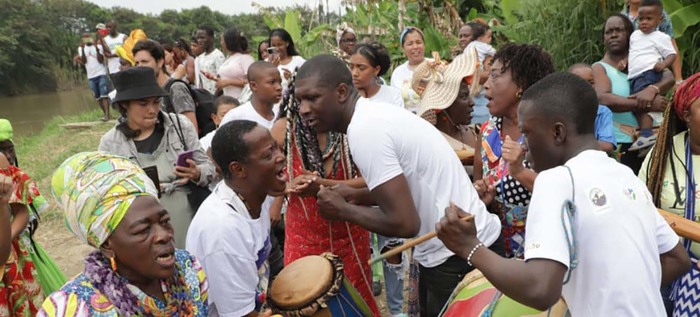The Intersection of Ley 70 and the Petronio Álvarez Festival:
- Valerie Summers

- Aug 16, 2023
- 3 min read
A Confluence of Afro-Colombian Heritage and Human Rights Defense
At AFRORESISTANCE, we view the Pacific Petronio Álvarez Music Festival as more than a cultural event. It's the largest festival honoring black culture in the Americas. Since its inception in 1997, the festival has transformed into a beacon of light, reflecting the rich diversity, unparalleled talent, and resilient spirit of Afro-Colombian culture.
Each year, it is estimated that over 1,200 artists from the Pacific region of Colombia gather in Cali, where through music, they share their love for our culture and our own Black stories, cultures, and histories. #PetronioAlvarez is a powerful symbol of our continued fight for visibility, inclusion, and recognition of the rights of Afro-Colombian communities.
But, we must not forget that the Petronio Álvarez Festival stands on the solid foundations of Law 70 of 1993. This legal instrument, enacted on August 27, 1993, recognized and guaranteed the territorial, cultural, and economic rights of Afro-Colombian communities, setting a historic precedent for our civil rights. Law 70 has played a vital role in the protection and promotion of our human rights.
Since its establishment in 1993, the implementation of Law 70 has faced multiple challenges, including a lack of recognition and awareness of its importance in some social and governmental sectors. Over the years, various Colombian governments have not fully acknowledged the depth and scope of this law, especially because of tensions generated by economic interests in and around ancestral lands, bureaucracy and slowness in its implementation, discrimination, violence, and armed conflicts in Afro-Colombian territories, lack of effective tools for its comprehensive application and lack of dispute resolution.
In relation to the above, Law 70, far from being a mere milestone of the past, remains an active and fundamental tool in the struggle of Afro-Colombian communities. Therefore, this legislation not only stands as a gateway to our rights but acts as a bridge and a tool for Afro-Colombian communities to keep demanding accountability from Colombian governments at all levels, validate our traditions, and protect our lands and cultural legacy.
Further, it is essential to continue fostering the effective creation and implementation of public policies that not only recognize our rights but also establish plans, programs, and projects aimed at transforming the socio-economic realities of Afro-Colombian communities. The fight for justice, equality, and recognition goes beyond mere inclusion; it requires systematic and structural change. In the words of Frantz Fanon, "Each generation must, to some extent, find its way or perish." This idea refers to the ongoing duty of generations to fight for their rights and define their position in the world.
At AFRORESISTANCE, we believe it is essential to give voice to all members of our community, we join the voices demanding justice and equality, including black trans women.
In this year 2023, marking the 26th anniversary of the Petronio Álvarez Festival and the 30th anniversary of Law 70, we remember our past and chart our path to the future. We have the duty to continue our fight for human rights, to keep creating safe spaces, and to raise our voices in solidarity. The rumble of the marimba, the joy of the dances, the brightness of the costumes, and the human warmth at each edition of the festival, are reminders of the beauty of our culture and the importance of equality, diversity, and human rights.
We urge everyone to use the hashtags #PetronioAlvarez and #Law70 not only to celebrate our history and culture but also to encourage action. Together, we can ensure that the next generation of Afro-Colombians, and in particular, black women and black trans women, can live in a country that celebrates diversity, respects inclusion, and protects human rights.
#PetronioAlvarez, #Law70, #HumanRights, #AfroColombianity, #AFRORESISTANCE #WeAreAFRORESISTANCE, #WeAreAfroColombians, #WeAreResilience.
















Comments